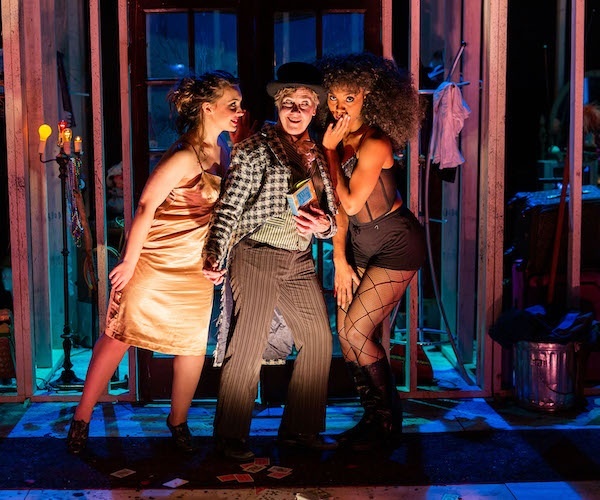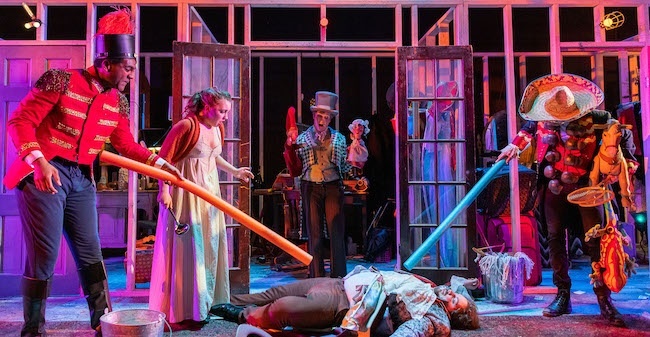Theater Review: “Vanity Fair: An (Im-)morality Play” — Amoral Fun Galore!
By David Greenham
Underground Railway Theater has a runaway hit. You’ll never see a show quite like it. It’s bold, ridiculous, and very risky.
Vanity Fair: An (Im-)morality Play by Kate Hamill, from the novel by William Makepeace Thackeray. Directed by David R. Gammons. Scenic design by David R. Gammons. Costume design by Leslie Held. Properties coordinated by Ciara McAloon. Lighting design by Jeff Adelberg, Sound design by David Wilson. Fight direction by Victor Ventricelli. Produced by Underground Railway Theater at Central Square Theatre, Cambridge, MA, through February 23.

Josephine Moshiri Elwood, Debra Wise, and Malikah McHerrin-Cobb in the URT production of Vanity Fair. Photo: Nile Scott Studios.
Poor Becky Sharp. She really has never gotten the respect she deserves. Thackeray’s antiheroine is one of a kind. Since the first time I met her I have thought she ought to be up there with the great characters of English literature. Jane Eyre and Elizabeth Bennet have nothing on her. She’s feisty, calculating, ambitious, and determined. She’s long overdue for some proper recognition.
Thankfully, clever playwright Kate Hamill and the zanies at Underground Railway Theater agree. Hamill, who has made a career out of unpacking classics and remolding them for the 21st century, has come up with another revamped gem. Vanity Fair: An (Im-)morality Play premiered at the Pearl Theatre in NYC in 2017, with Hamill herself playing Becky. For the Boston run, well-known director David R. Gammons has festooned the flexible Central Square Theater space with a yard sale’s worth of gadgets, doodads, and surprising rummage sale discoveries. Also on hand is a team of talented designers and a first-class stable of comedic actors.
From the moment you walk through the door and view the wonky and wonderful set of seven clunky dressing rooms lined along the narrow stage, you know you’re in for a curious experience. Each dressing room is essentially only a door, the series of entrances connected by two-by-four wooden frames.
There are no walls, so the action is visible on either side of the dressing room. Each room is crammed with period and anachronistic bric-a-brac: lace-draped lamps and Victorian china pieces sit alongside boom boxes and sombreros.
Once the audience members find their seats, cast members lumber to the stage with varying attitudes of discontent and suspicion. In the center of the set is the Manager (laser-focused Debra Wise), who watches all that’s going on from her cluttered desk. She marks notes vigorously in her dog-eared copy of Thackeray’s novel while an updated version of Peggy Lee’s “Is That All There Is?” plays in the background. At the appointed moment, the lights dim, footlights (!) power up, and she moves downstage center to warn the audience, conspiratorially, “There are no morals here.” The next two-and-a-half hours fly by with amoral glee.
Vanity Fair is, at its core, the story of three outsiders: the poor but ambitious Rebecca (Becky) Sharp (Josephine Moshiri Elwood); passive and tender Amelia Sedley (Malikah McHerrin-Cobb), who comes from a wealthy family; and the inevitably uncomfortable William Dobbin (Paul Melendy), the ever-faithful friend who hides his love.
The remaining members of the cast—David Keohane, Stewart Evan Smith, and Evan Turissini—play at least 10 characters among them, including a talking floor mop.
But really, at the center of the story is the indefatigable Becky, who is determined to master the politics of wealth and upward mobility. She exclaims that she “shall win this game or die trying!” So, like all good Victorian young women, she dons her leather jacket, picks up a notebook and a guitar case covered with stickers, and sets out to succeed. Will she think fondly of Miss Pinkerton’s School, where Amelia and Becky met? “I wouldn’t spit on this place if it were on fire!”
The many adventures of Becky, the sad naiveté of Amelia, and the unrequited love of Dobbin are dramatized with clarity and spirited aplomb. But what makes this production so wonderful is how it gets to where it is going—the destination is beside the point. Director Gammons (who also designed the set) has assembled a near-perfect cast.

Stewart Evan Smith, Josephine Moshiri Elwood, Debra Wise, Paul Melendy, and Evan Turissini (lying on ground) in the URT production of Vanity Fair. Photo: Nile Scott Studios.
At the center is Debra Wise’s Manager, who spies everything, comments often, and proves herself to be both a reliable and unreliable narrator, reflecting Thackeray’s see-sawing loyalties. And when she is given an opportunity to become one of the characters, Wise brings an off-kilter Dowager Countess feel to her wacky Matilda Crawley.
Evan Turissini has a blast playing a dullard and the often drunk pile of characters in his charge, as does the expertly self-admiring Stewart Evan Smith, who scores as the lying and conniving George Osborne. David Keohane shines as Rawden Crawley, and luminous Malika McHerrin-Cobb is sweet and heartbreaking as Amelia. Paul Melendy’s physical comedy skills bring Dobbin, Miss Pinkerton, and Rose Crawley to roaring life. He’s really funny. As you would hope, Josephine Moshiri Elwood’s confident and quick-witted Becky carries the production. The performer approaches the role with impressive vim and vigor, aiming well-timed asides to the audience. We’re co-conspirators in Becky’s antics, delighted to take the ride.
While the accolades are flying, kudos should also go to the design team. Gammons’s set serves up layers of clever clutter that demand to be examined for hours. Properties coordinator Ciara McAloon must have hit every thrift shop in greater Boston to create this unusual set. Leslie Held’s clever costumes are memorable, and Jeff Adleberg’s lights are endearingly chaotic and enormous fun. When a light cue gets a laugh, you know a production has hit its stride. Likewise, David Wilson’s sound design breaks nearly every hallowed rule for setting period—and it works perfectly.
In short, Underground Railway Theater has a runaway hit. You’ll never see a show quite like it. It’s bold, ridiculous, and very risky. It’s one of those magical theatrical events where the spell could be broken because of the churn of its outrageous energy. But everyone involved is fully committed to the iconoclastic concept, gripping Hamill’s brilliant script with both hands. Thanks to Hamill, Becky Sharp can finally take her place among the tip-top female characters in English literature. But traditionalists, be warned: she’s bringing her sock puppet, pool noodles, and fart jokes with her!
David Greenham is an adjunct professor of Drama at the University of Maine at Augusta, and is the Associate Director for the Holocaust and Human Rights Center of Maine. He is the current chair of the Maine Arts Commission, and has been a theater artist and arts administrator in Maine for more than 25 years.
Tagged: Central Square Theater, David Greenham, David R. Gammons, Underground Railway Theater, Vanity Fair

